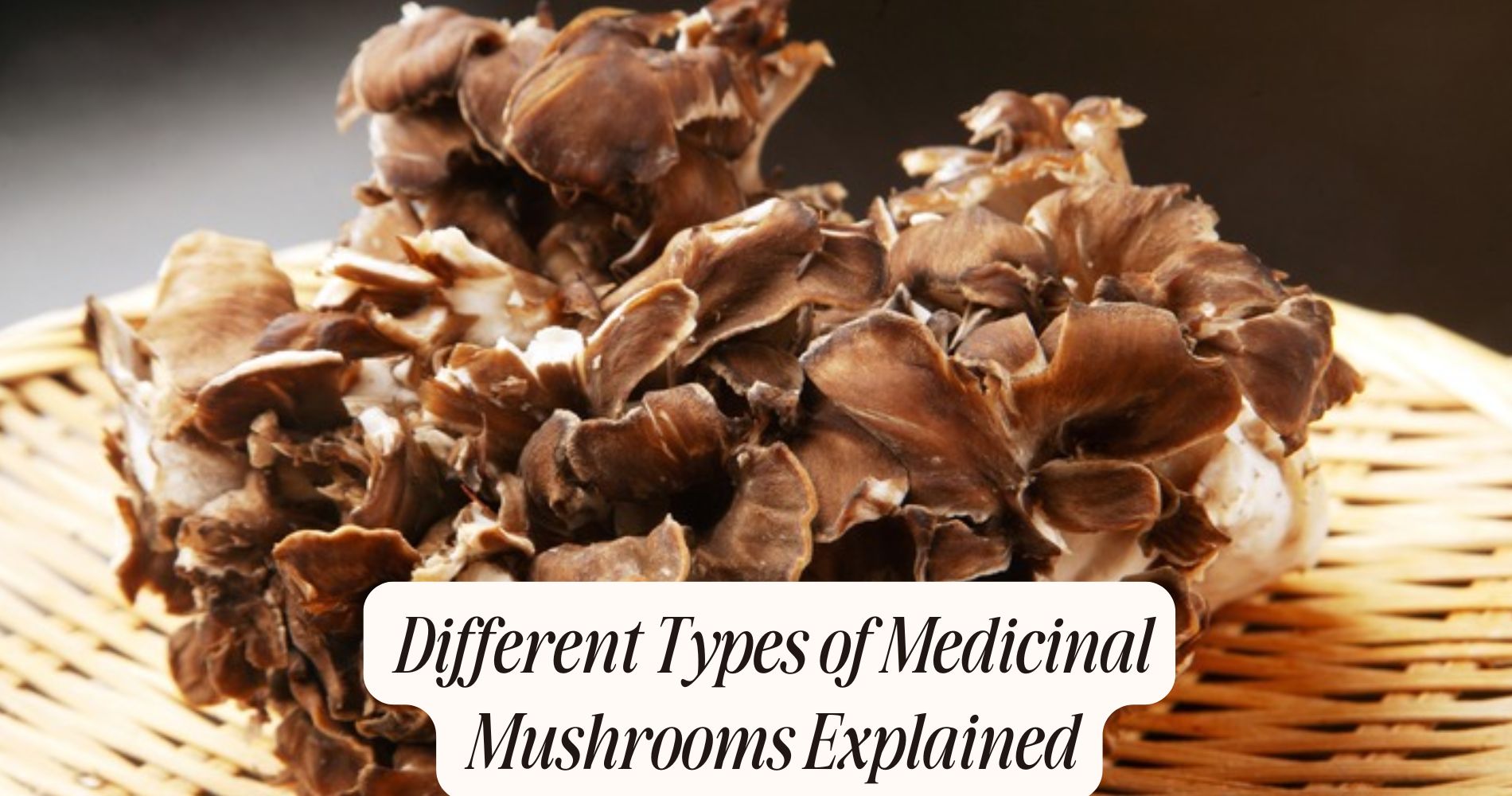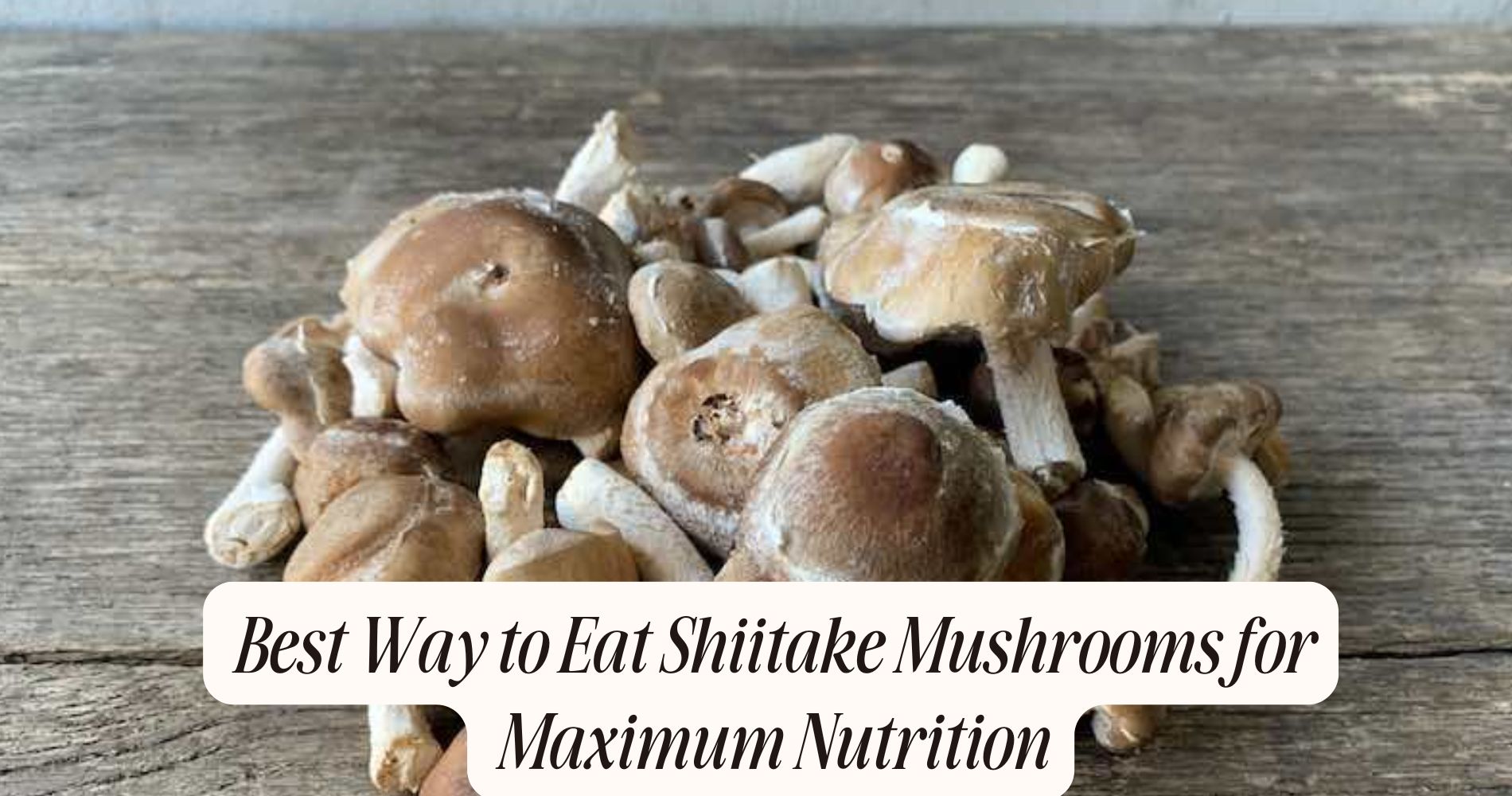
Different Types of Medicinal Mushrooms Explained
When exploring different types of medicinal mushrooms, you'll encounter a variety of species, each with unique benefits. The Reishi mushroom enhances immune response and promotes better sleep. Lion's Mane improves cognitive function by stimulating nerve growth factor. Chaga offers powerful antioxidant properties, combating free radicals. Cordyceps boosts energy by improving oxygen utilization. Turkey Tail mushrooms support immune health, while Maitake aids in blood sugar control through enhanced insulin sensitivity. Shiitake mushrooms are nutritious, rich in essential vitamins and minerals. Each mushroom has distinct compounds that contribute to its therapeutic effects, and uncovering these nuances can deepen your understanding.
Reishi Mushroom Benefits
When you consider the myriad of medicinal mushrooms, the reishi mushroom stands out for its extensive health benefits. Known scientifically as Ganoderma lucidum, this fungus has been utilized in traditional medicine for centuries.
Traditionally, it's been used to enhance longevity, boost the immune system, and reduce stress. The active compounds in reishi, such as triterpenes and polysaccharides, contribute to these benefits by modulating immune responses and exhibiting anti-inflammatory properties.

For those seeking to incorporate reishi into their wellness routine, reishi extract and reishi tea are popular forms. Dosage guidelines vary, but a common recommendation for reishi extract is between 1 to 3 grams daily, while reishi tea can be consumed several times throughout the day.
It's crucial to start with a lower dosage and gradually increase based on individual tolerance and health goals.
The health benefits of reishi mushroom extend beyond immune support; users often report improved sleep quality, reduced anxiety, and enhanced overall well-being.
Lion's Mane for Cognitive Health
Lion's Mane mushroom, scientifically known as Hericium erinaceus, has gained attention for its remarkable potential in supporting cognitive health. Research indicates that compounds within Lion's Mane, particularly hericenones and erinacines, stimulate the production of nerve growth factor (NGF). This protein is essential for the survival and maintenance of neurons, thereby playing an important role in cognitive enhancement.
You might find that regular consumption of Lion's Mane can lead to noticeable memory improvement. Studies have shown that participants who ingested Lion's Mane extract demonstrated significant enhancements in cognitive function, particularly in tasks related to memory recall and recognition.

This mushroom's neuroprotective properties may even help mitigate age-related cognitive decline, making it a promising option for those seeking to maintain mental sharpness as they age.
Incorporating Lion's Mane into your routine, whether through supplements or culinary dishes, can effectively support your cognitive health. As ongoing research continues to reveal its benefits, you may discover that this medicinal mushroom plays a key role in enhancing your cognitive capabilities and overall brain function.
Chaga's Antioxidant Properties
Chaga mushrooms are rich in antioxidants, primarily due to their unique nutrient composition, which includes polysaccharides and phenolic compounds.
These antioxidants play a critical role in neutralizing free radicals, potentially reducing oxidative stress and inflammation in the body.
Understanding Chaga's health benefits requires an analysis of how these compounds interact at a cellular level, influencing overall wellness.
Nutrient Composition Overview
Rich in a variety of bioactive compounds, Chaga mushrooms are particularly renowned for their exceptional antioxidant properties. When you analyze their nutrient composition, you'll find that they're abundant in polysaccharides, phenolic compounds, and melanin, all of which contribute to their potent antioxidant capacity. These compounds act synergistically to neutralize free radicals, thereby protecting cells from oxidative stress.
Chaga serves as an excellent nutrient source, providing vitamins B and D, along with essential minerals like zinc, magnesium, and potassium. This diverse nutrient profile makes Chaga a valuable addition to your dietary integration, whether through teas, tinctures, or powdered forms.
The bioavailability of these nutrients can be enhanced through specific preparation methods, such as steeping or simmering, which help extract the beneficial compounds effectively.
Moreover, the high levels of superoxide dismutase (SOD) in Chaga further bolster its antioxidant effects. By incorporating Chaga into your routine, you can harness these unique properties, supporting overall cellular health and enhancing your body's natural defenses.
Understanding this nutrient composition allows you to make informed choices about integrating Chaga into your health regimen.
Health Benefits Explained
Harnessing the power of antioxidants, Chaga mushrooms offer a range of health benefits that can greatly enhance your well-being. Known scientifically as Inonotus obliquus, Chaga is among the most potent mushroom varieties when it comes to antioxidant activity. These compounds combat oxidative stress, which is linked to various chronic diseases, including cancer and cardiovascular conditions.

Chaga's traditional uses in herbal medicine underscore its health-promoting properties, often applied to boost immunity and improve overall liveliness. The high concentration of polyphenols and betulinic acid in Chaga contributes to its anti-inflammatory effects, making it a valuable ally in managing conditions like arthritis.
Moreover, studies suggest that Chaga may support liver health by enhancing detoxification processes, thereby improving metabolic function.
Cordyceps for Energy Boost
Energy enhancement is a sought-after benefit of Cordyceps, a unique genus of fungi known for its adaptogenic properties. These fungi, particularly Cordyceps sinensis and Cordyceps militaris, are recognized for their potential to increase athletic performance and stamina.
The active compounds, including adenosine and cordycepin, play a vital role in enhancing oxygen utilization and ATP production in your cells, thereby boosting energy levels.
When considering Cordyceps supplements, it's important to choose high-quality products to guarantee efficacy. Common forms include capsules, powders, and extracts, which vary in concentration.
For best results, a typical Cordyceps dosage ranges from 1,000 to 3,000 mg per day, although individual needs may vary based on activity levels and health goals.

Incorporating Cordyceps into your regimen can support energy metabolism, especially for those engaged in strenuous physical activities.
However, it's wise to consult a healthcare professional before starting any supplementation, particularly if you have underlying health conditions or are taking medications.
With the right dosage and quality, Cordyceps can be a valuable addition to your energy-boosting strategies.
Turkey Tail and Immune Support
Turkey Tail mushrooms contain key active compounds, such as polysaccharopeptides, that demonstrate significant immune system benefits.
By enhancing the activity of immune cells like macrophages and natural killer cells, Turkey Tail supports your body's defense mechanisms.
Understanding the appropriate usage and dosage is essential for maximizing these health benefits effectively.
Key Active Compounds
Medicinal mushrooms, particularly Turkey Tail (Trametes versicolor), consistently demonstrate a robust potential for immune support, largely due to their unique active compounds. Among these, polysaccharide-K (PSK) and polysaccharide peptide (PSP) stand out for their significant medicinal properties.
PSK, a beta-glucan, plays an essential role in modulating immune responses, enhancing the activity of macrophages and natural killer cells. This action can lead to improved pathogen recognition and elimination.
In addition to PSK, PSP contributes to the mushroom's immunomodulatory effects. It's known for stimulating lymphocytes, thereby promoting a balanced immune reaction.
These active compounds also exhibit antioxidant properties, which may help mitigate oxidative stress within the body, further supporting immune health.
Moreover, the synergistic effects of these compounds can amplify Turkey Tail's medicinal properties, making it a valuable ally in maintaining immune function.
When consumed regularly, Turkey Tail may boost your overall resilience against infections. Understanding these key active compounds allows you to appreciate how Turkey Tail works in your body, highlighting its potential as a functional food in immunological health.
Immune System Benefits
When it comes to immune support, Turkey Tail (Trametes versicolor) stands out as a powerful ally due to its extensive research-backed benefits. This mushroom's extracts are rich in polysaccharopeptides, particularly PSK (polysaccharide krestin) and PSP (polysaccharide peptide), which have shown significant potential in enhancing the immune response.
Studies indicate that these compounds can stimulate the activity of immune cells, such as macrophages and natural killer cells, increasing your body's ability to fend off pathogens. By modulating immune system activity, Turkey Tail helps to balance immune function, ensuring it's neither underactive nor overactive. This is vital, as a well-regulated immune response is essential in preventing both infections and autoimmune disorders.
Furthermore, Turkey Tail extracts may assist in gut health, where a significant portion of your immune system resides. By supporting beneficial gut flora, these extracts contribute to overall immune resilience.

The synergistic effects of Turkey Tail make it a valuable addition to any regimen aimed at bolstering immune health, particularly during times of stress or illness. Therefore, incorporating Turkey Tail into your wellness routine can be an effective strategy for enhancing your immune support.
Usage and Dosage
Often regarded as a versatile supplement for immune support, Turkey Tail can be taken in various forms, including capsules, powders, and teas. Each form offers unique advantages, but it's essential to follow usage guidelines to maximize benefits.
When selecting a product, verify it's sourced from reputable manufacturers to guarantee quality and potency.
Dosage recommendations for Turkey Tail typically range from 1 to 3 grams per day, depending on the specific product and your individual health needs. For capsules, you might take 2 to 6 capsules daily, while powders can be mixed into smoothies or soups.
If you opt for teas, brewing a strong infusion using 1 to 2 teaspoons of dried Turkey Tail per cup of water is advisable.
It's important to start with a lower dose and gradually increase it, monitoring your body's response. Consulting with a healthcare professional can provide personalized advice, especially if you're on medication or have underlying health issues.
Shiitake and Nutritional Value
Shiitake mushrooms, prized for their rich umami flavor, also boast impressive nutritional value, making them a staple in both culinary and health-focused diets.
They're particularly high in essential nutrients like vitamins B2 (riboflavin), B3 (niacin), and D, which play crucial roles in energy metabolism and immune function. Additionally, shiitake mushrooms contain polysaccharides, especially lentinans, known for their immune-boosting properties.
Incorporating shiitake into your meals can yield numerous shiitake benefits. These mushrooms are low in calories yet rich in fiber, aiding digestion and promoting satiety.

Their antioxidant properties help combat oxidative stress, which is essential for overall health. When you explore shiitake recipes, you'll find that they lend themselves well to various dishes, from stir-fries to soups, enhancing both flavor and nutrition.
Furthermore, shiitake mushrooms contain ergothioneine, a unique antioxidant that may contribute to heart health and longevity.
Choosing shiitake as a regular part of your diet not only enhances your culinary creations but also boosts your nutritional intake, making it a smart choice for anyone looking to improve their health through food.
Maitake for Blood Sugar Control
Maitake mushrooms, known for their distinctive frilled appearance and rich flavor, play a significant role in blood sugar control. Research indicates that compounds in Maitake, particularly polysaccharides like beta-glucans, enhance insulin sensitivity and reduce blood glucose levels. This is vital for individuals managing diabetes or prediabetes.
Maitake research highlights its potential to regulate glucose metabolism effectively. In clinical studies, participants consuming Maitake extract showed significant reductions in fasting blood sugar levels compared to control groups. The observed effects suggest that integrating Maitake into your diet could provide therapeutic benefits.

When considering Maitake dosage, studies typically recommend around 1 to 3 grams of powdered extract daily, although individual responses may vary.
It's important to consult with a healthcare provider to determine the appropriate dosage tailored to your specific health needs, especially if you're on medication for blood sugar management.
Experience the Power of 10 Mushrooms with SUPER MUSHROOM GUMMIES
Curious about the benefits of multiple types of medicinal mushrooms? Try SUPER MUSHROOM GUMMIES by Well Gummies for an easy and delicious way to enjoy them! Each gummy is packed with 10 functional mushrooms, carefully selected to fuel your brain, enhance focus, and support immune health. These vegan-friendly gum chews offer a natural boost of energy without the jitters or crashes, keeping you balanced and sharp all day long.
With the refreshing taste of wild berries, they’re as delightful as candy—perfect for busy days when convenience matters. Elevate your wellness routine effortlessly with SUPER MUSHROOM GUMMIES!
Frequently Asked Questions
Are There Any Side Effects of Consuming Medicinal Mushrooms?
Yes, consuming medicinal mushrooms can lead to side effects like allergic reactions in sensitive individuals and potential mushroom toxicity if improperly sourced. Always consult a healthcare professional to mitigate risks before incorporating them into your diet.
How Can I Incorporate Medicinal Mushrooms Into My Diet?
You can incorporate medicinal mushrooms into your diet by adding them to smoothie recipes or using cooking tips like sautéing or blending. Experiment with different varieties to enhance flavor and health benefits in your meals.
Are Medicinal Mushrooms Safe for Children and Pregnant Women?
When considering medicinal mushrooms for children and pregnant women, you should follow safety guidelines and age considerations. Consult healthcare professionals to guarantee appropriate usage and avoid potential risks associated with their unique physiological conditions.
Can Medicinal Mushrooms Interact With Medications?
Yes, medicinal mushrooms can interact with medications. Understanding mushroom pharmacology and interaction mechanisms is essential, as certain compounds may enhance or inhibit drug metabolism, potentially altering therapeutic effects and side effects in your treatment regimen.
Where Can I Buy High-Quality Medicinal Mushroom Products?
You can buy high-quality medicinal mushroom products from reputable online retailers, which often provide detailed sourcing information. Additionally, explore local markets where vendors may offer fresh or dried options, ensuring quality and authenticity in your selection.
Conclusion
Incorporating medicinal mushrooms into your wellness routine can greatly enhance your health. Each type offers unique benefits, from Reishi's stress-reducing properties to Lion's Mane's cognitive enhancements. Chaga's potent antioxidants combat oxidative stress, while Cordyceps can elevate your energy levels. Turkey Tail supports your immune system, Shiitake enriches your diet with essential nutrients, and Maitake helps regulate blood sugar. By understanding these diverse fungi, you can make informed choices to optimize your overall well-being.




